Following the implementation of new age verification laws in Arizona on September 26, 2025, the state has witnessed an unprecedented surge in demand for Virtual Private Networks (VPNs). Google Trends data reveals that Arizona now leads all U.S. states in search interest for “VPN,” significantly surpassing even Maryland, which ranks second. This heightened interest stems from many Arizonans, and indeed Americans nationwide, viewing VPNs as a crucial tool to circumvent these new age verification mandates.
While these laws aim to protect online users, they compel individuals to disclose sensitive personal data for age verification, opening the door to potential cybersecurity risks. This concern is driving a wave of new VPN sign-ups and increased searches for these privacy tools across the state and beyond, as 24 U.S. states now have active age verification legislation, with more bills pending.
Arizona’s Soaring VPN Interest
Over the past month, Arizona has experienced a dramatic uptick in VPN searches. The two weeks leading up to the September 26 age verification law deadline saw a consistent rise, peaking sharply on September 27. Although interest dipped slightly between September 28-30, it shows signs of renewed ascent.
Proton VPN, a leading provider, reported a staggering 450% increase in sign-ups in Arizona compared to its baseline. This surge highlights the immediate impact of the new legislation. Proton VPN is known for being a fast and reliable service, offering both premium and a highly regarded free version, making it an attractive option for new users. Google Trends confirms this, listing “Proton VPN download” as a top rising search term in Arizona. Other popular searches include “VPN for Safari,” inquiries about NordVPN pricing (“how much is NordVPN”), and whether “is NordVPN free” (it isn’t, starting at $3.09/month for its 27-month plan).
Further demonstrating this heightened awareness, Arizonans’ top VPN-related searches include “VPN free,” “best VPN,” “what is VPN,” “iPhone VPN,” and “NordVPN.” This comprehensive list underscores a strong and diverse interest in understanding and acquiring these privacy tools.
NordVPN: A Top-Rated Choice
Among the multitude of options, NordVPN consistently ranks as a top performer. It offers exceptional speed, robust privacy features, and effectively unblocks global streaming services. Plans begin at $3.09 per month on its 2-year package, which includes an additional three months free, backed by a 30-day money-back guarantee for risk-free testing.
Wider Trends: VPN Interest Across the US
The phenomenon isn’t exclusive to Arizona. Ohio, where age verification laws became effective on September 30, also experienced a noticeable increase in VPN searches. While not as dramatic as Arizona’s spike, Ohio saw a significant surge between September 28-30, coinciding with the law’s introduction. Key search terms in Ohio include “free VPN,” “best VPN,” “what is VPN,” “Proton VPN,” and “VPN for Netflix.”
Missouri, with age verification laws set to take effect on November 30, shows consistently high, albeit less volatile, VPN search interest. This trend is expected to intensify as the deadline approaches, mirroring the experiences in Arizona and Ohio.
Michigan’s Proposed VPN Ban
Michigan presents a unique case. Although its age verification bill is still in committee (referred on May 6, 2025), lawmakers there have proposed a controversial “Anticorruption of Public Morals Act.” Introduced in September 2025, this bill seeks to outlaw “circumvention tools” like VPNs, threatening fines up to $500,000 for their promotion or sale. Such a ban would be a severe blow to internet freedom and represents a form of widespread internet censorship, restricting digital liberties for millions.
This proposal sparked a surge in Michigan’s VPN searches between September 12-20, which, despite a slight dip, remain elevated. Popular breakout searches include “what is a VPN on iPhone,” “free VPN download,” and “NordVPN cost.”
Across the nation, it’s evident that Americans are actively researching and adopting VPNs as they increasingly confront online restrictions and threats to their digital privacy. This trend is poised to grow as more states enact similar legislation.
Are Age Verification Laws Truly Effective?
The efficacy of age verification laws and internet policing has sparked considerable debate. Critics question whether these measures genuinely combat cybercrime or effectively shield children from harmful content, especially when they come at the cost of personal privacy and threaten tools like VPNs.
Laura Tyrylyte, a privacy advocate at NordVPN, acknowledges the genuine intent behind these laws to safeguard children online. However, she warns against the inherent dangers: “Age verification requirements necessitate customers to disclose sensitive personal information to third-party processors, many of which operate outside controlled environments.” This practice, Tyrylyte explains, creates “significant risks of data breaches, profiling, and abuse issues.”
Instead, Tyrylyte advocates for “device-level controls” as the most effective solution for managing children’s internet access. Tools such as parental controls, which can limit app downloads, impose age ratings, and block inappropriate content, offer a more secure and targeted approach without compromising broader digital privacy. Increasing public awareness and adoption of these existing tools, she suggests, would be far more beneficial.

 日本語
日本語 한국어
한국어 Tiếng Việt
Tiếng Việt 简体中文
简体中文